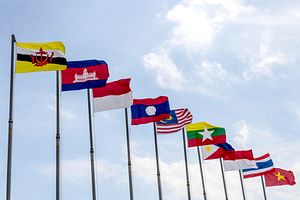Is there someone here who does not have a dead brother? I have a dead brother. He was killed by a bullet to his head. It was before dawn on the 1st of January, 1994 (…) for this purpose we Zapatistas have many big pockets in our uniforms; not for keeping bullets, for keeping brothers –Subcomandante Marcos.
So goes the rather chilling, if not literal, claim made at one of the Zapatistas Encuentros, protesting the Mexican government’s decision to sign on to the North American Free Trade Area (NAFTA) in 1994 and leaving the poor people of Chiapas behind. Although it might seem farfetched, a hypothetical question deserves an answer: Will the ASEAN Economic Community (AEC) create another Chiapas?
In fewer than seven months from now, Southeast Asian countries will implement the AEC, beginning a critical time for this region, including Indonesia. Admittedly, Jakarta has been working hard to prepare for the AEC. Yet the current ambience seems gloomy, especially with the specter of the trade imbalance that Indonesia was left with after the ASEAN-China Free Trade Area (ACFTA) and the weak performance of Indonesian small and medium enterprises (SMEs).
Crucial Issues
ASEAN officials have repeatedly emphasized the importance of SMEs, as the backbone of the regional economy. The process of regional economic integration is expected to encourage SMEs to upgrade their capabilities and narrow the development gap among ASEAN economies. As a result, ASEAN countries are committed to both implementing the AEC Blueprint for easing tariff and non-tariff barriers, and to monitoring the process based on statistical measures.
However, the reality is much more complex than scorecard numbers. The first problem is the lack of public awareness of the AEC’s opportunities and challenges. Although there is a growing familiarity with the terms ASEAN and AEC, most SMEs still do not know what to expect and anticipate. This is largely a reflection of a lack of interest in learning more about other ASEAN countries or expanding market overseas. This fact is certainly worrying: SMEs account for more than 97 percent of the Indonesian workforce, but their total contribution to Indonesia’s non-oil and gas exports has been gradually declining, from 20.15 percent in 2003 to 16 percent in 2014.
Second, although Indonesia has enjoyed steady development for more than a decade, the World Competitiveness Index 2014-2015 Report notes that a lack of skilled human resources, poor infrastructure facilities, and weak technological knowledge persist as serious problems for the Indonesian economy. This has implications for the SME sector, especially in the form of limited banking and transportation access, a lack of knowledge about ASEAN product standardization and export-import procedures, as well as insufficient technical understanding. Although Jakarta has confirmed 90.5 percent of the AEC blueprint, some major discrepancies remain between the harmonization policies adopted and the ability of SMEs to tap into the system and take advantage of it.
The third problem is the inadequacy of the existing AEC preparation. Although there have been some important regulations associated with SME and AEC preparation, as well as several commitments made at the local and national levels, inter-agency coordination of ideas and policies has been poor. As such, some local governments are still confused about the central-local coordination mechanism and unsure of the framework of the AEC.
Bracing for 2015
To address these concerns, Indonesian President Joko “Jokowi” Widodo needs to act now. Despite much rhetoric delivered during both his campaign and his presidency on prioritizing people’s welfare and economic productivity, Jokowi needs to provide more tangible incentives in empowering SMEs. Instead of turning to protectionism to undermine other countries’ SME products, the government should boost local SMEs’ competitiveness by granting special tax breaks, providing assistance in information technology, offering help in understanding ASEAN product standardization and customs systems, and invigorating the banking system via export-import banks to support market expansion.
Improving inter-agency coordination will be equally important. Indeed, Jokowi is currently pursuing new initiatives, especially in establishing a Creative Economy Board and supporting SMEs’ marketing through the UKM Indonesia WOW project. However, more comprehensive coordination will be crucial, especially in coordinating national-local policies. Its effectiveness could also be enhanced by expanding the participation of non-state actors, such as inviting participation from business and their corporate social responsibility programs, along with trade associations, NGOs, universities, and civil societies. Realizing that ASEAN-related projects are often perceived as elitist, greater involvement by non-state actors will lead to a stronger commitment to building a sense of community, as well as better policy contextualization and preparation at both the national and local levels.
Certainly, market liberalization processes are often a double-edged sword, bringing opportunity for business expansion, but also opening greater risk for economic inequality. Hence, in dealing with the SMEs’ challenges, Jokowi should not only maintain his signature trait in communicating well with “wong cilik” [lower-class people]; he should also empower them to survive the AEC, leading Indonesia down a different path than the one Chiapas chose.
Randy W. Nandyatama is a lecturer at the Department of International Relations, Gadjah Mada University, Indonesia; and is currently a doctoral student at the University of Melbourne, Australia.

































